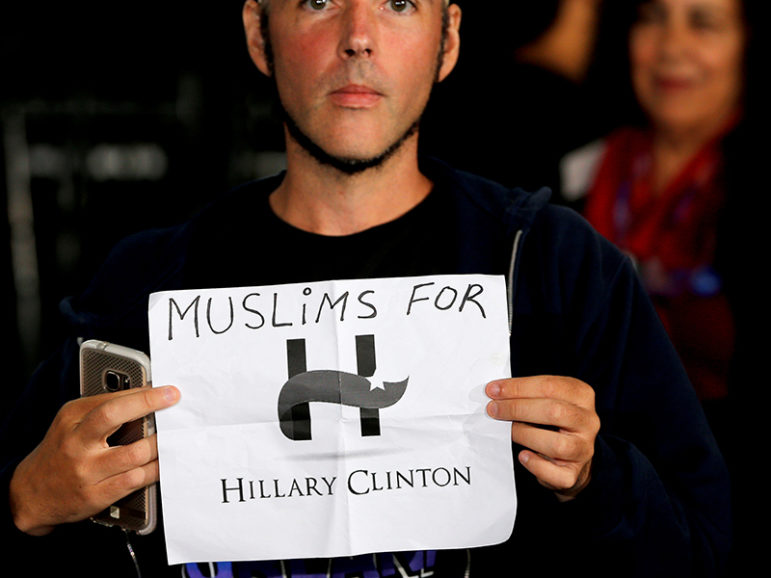(RNS) A new survey confirms what many have long suspected: An overwhelming majority of Muslim Americans favor Democratic nominee Hillary Clinton over Republican nominee Donald Trump.
The nationwide survey released Thursday (Oct. 13) by the Council on American-Islamic Relations found that 86 percent of all registered Muslim voters intend to vote on Nov. 8, and 72 percent say they will cast their vote for Clinton.
Only 4 percent of the survey’s 800 respondents said they would vote for Trump. Three percent plan to vote for Jill Stein, and 2 percent said they would vote for Gary Johnson.
Ninety-one percent of the respondents thought Trump’s proposed ban on Muslims entering the United States was wrong. After last year’s San Bernardino, Calif., shooting, Trump’s campaign released a statement calling for a complete ban on Muslims immigrating into the U.S. “until our country’s representatives can figure out what is going on.”
The survey also shows that 85 percent of respondents believe Islamophobia is on the rise. In addition, 30 percent said that they were victims of discrimination or profiling in the past year.
During the second presidential debate, on Oct. 9, undecided Muslim voter Gorbah Hamed asked Trump and Clinton how they would help Muslims like her “deal with the consequences of being labeled as a threat to the country.”
Trump pointed to the issue that he called “radical Islamic terrorism,” saying that the burden is on Muslims to disclose extremists.
“We have to be sure that Muslims come in and report when they see something going on,” he said.
Clinton deviated from Trump’s definition of the threat. Instead, she said that American’s problem is with “violent jihadist terrorists.”
“We are not at war with Islam,” Clinton said, “and it is a mistake, and it plays into the hands of the terrorists, to act as though we are.”
CAIR Government Affairs Director Robert McCaw said he felt as if both candidates’ identifications of the problem were unhelpful.
“There is no jihad that the Islamic State could commit that would be in the name of Islam,” McCaw said. “I would never apply this term to the criminal state ISIS.”
The survey found that the number of Muslim respondents who felt the Republican Party was unfriendly toward Muslims increased to 62 percent from 51 percent in a 2012 survey. At the same time, the number of Muslims who are affiliated with the Republican Party has stayed relatively constant at 6 percent, similar to 2012’s 9 percent and 2008’s 8 percent.
McCaw said one cause for the steady number of Muslim Republicans is that those who align with the Republican Party do so out of economic concerns rather than their civil rights concerns.
“Republican Muslims are still with the party because there’s obviously an economic platform that appeals to their interests,” McCaw said.
According to the survey, the top issues for American Muslims are civil rights, education, jobs and the economy, protecting students from bullying and harassment, the proposed ban on Muslims entering the U.S., and terrorism and national security.
In a statement, McCaw said, “Our survey results indicate that presidential candidates still have time to appeal to American Muslim voters by addressing issues such as the erosion of civil rights and growing Islamophobia.”
CAIR’s survey has a margin of error of plus or minus 3.5 percentage points.





